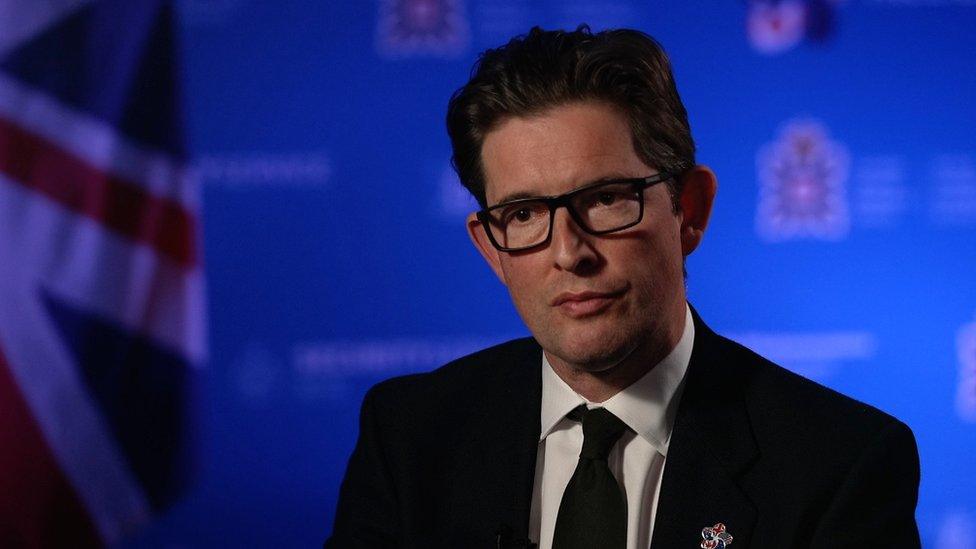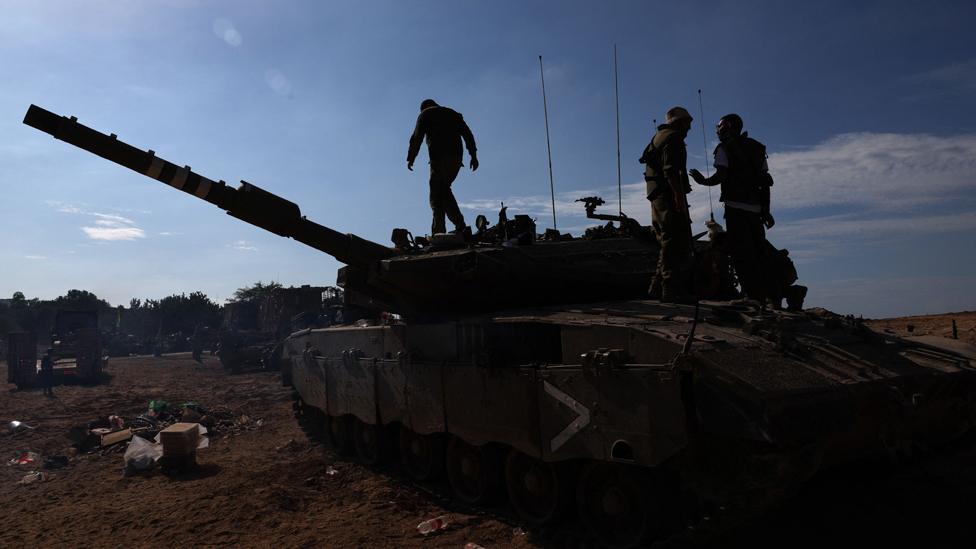MI5 fears Israel-Gaza war could fuel radicalisation
- Published

MI5 boss Ken McCallum says a major challenge is detecting when people with extremist mindsets might turn to violence
MI5 is monitoring for increased risks to the UK as the Israel-Gaza war continues, its head has told the BBC.
"One of the things that concerns me most right now, is to understand quite what the shape of the UK impact will be," Ken McCallum said in an interview.
He also warned there was a risk that events in the Middle East could radicalise people towards violence.
He was speaking at an unprecedented public appearance of security chiefs of the Five Eyes alliance in California.
The heads of US, UK, Australian, Canadian and New Zealand security agencies were appearing together for the first time to warn of technological innovation being stolen by China.
In an interview with the BBC, Mr McCallum said "the scale and monstrous nature" of the Hamas attack on Israel had come as a "shock".
Discussing the possibility of the Israel-Gaza conflict radicalising people in the UK towards violence, he said: "That is certainly a risk."
"It has always been the case that lots of would-be-terrorists in the UK draw inspiration through their distorted understanding of what is happening in other countries."
He said he could not comment on specific intelligence relating to any threats the Security Service is currently seeing.
But he said that MI5 was already watching a "pretty large cohort" of people with extremist mindsets and that one of the most challenging parts of its work was trying to detect when these people, often acting alone, suddenly moved towards violence in new or unpredictable ways.

The Israel-Gaza war has been reverberating around the world
In recent years, MI5 has seen a shift toward lone-actors inspired by events but not formally part of any organisation or group. They can be harder to spot and to work out when they are about to act, Mr McCallum said.
US officials say they have already seen a rise in reported threats in the wake of events in the Middle East.
"We cannot and do not discount the possibility that Hamas or other foreign terrorist organisations could exploit the conflict to call on their supporters to conduct attacks on our own soil," FBI Director Chris Wray, told reporters.
"We are also particularly alert to the potential these events have to inspire violence against Jewish Americans or Muslim Americans, institutions and houses of worship."
A six-year-old Muslim boy was stabbed to death in Illinois on Saturday in what has been described as a hate crime.
Stanford University in California was chosen as the venue for this unprecedented first public meeting of the Five Eyes because it lies in the heart of Silicon Valley and the security chiefs are issuing a public warning about China stealing innovation.
But in private meetings together, the Middle East will be high on the agenda.
"As you'd expect, we will also use our time together to discuss a range of other issues in private, including what Hamas's attack means both in the region and in our homelands," Mr McCallum said.
The MI5 head told the BBC that one of the most difficult aspects of the role was to balance resources against different types of threats which were equally concerning.
"How do you balance the ability to track a teenage would-be terrorist consuming extreme right-wing and hateful material in his bedroom and potentially considering buying a bladed weapon with the longer term risks posed by fast or precious cutting edge research from one of our universities? They both matter to our national security."

More on Israel Gaza war
Follow live: Latest updates
History behind the story: The Israel-Palestinian conflict
Hamas's attack on Israel: Who are the hostages?
Inside Gaza: The families who won't evacuate